|
|
|
Sort Order |
|
|
|
Items / Page
|
|
|
|
|
|
|
| Srl | Item |
| 1 |
ID:
145181
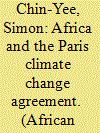

|
|
|
|
|
| Summary/Abstract |
ON 12 DECEMBER 2015, the 195 member states party to the United Nations Framework Convention on Climate Change (UNFCCC) formally adopted the Paris Agreement. This agreement, the culmination of many years of work by thousands of negotiators, scientists, academics, and representatives from civil society, replaces the failed Copenhagen Accord. During the Copenhagen conference in 2009, Lumumba Di-Aping, the then-Ambassador and Deputy Permanent Representative of Sudan to the United Nations in New York, and the Chair of the G77+China group, controversially stated that, ‘You cannot ask Africa to sign a suicide pact, an incineration pact in order to maintain the economic dominance of a few countries’.1 The Copenhagen conference witnessed deep splits amongst African delegates. South Africa was part of the coalition that drafted the final text behind closed doors (with Brazil, India, China, and the USA) and Ethiopia publicly supportive of the Accord, while many other African countries agreed with Di-Aping that it produced a disastrous outcome for the continent. This briefing considers African influence at the twenty-first conference of the parties to the UNFCCC (COP21) and asks whether the final deal is a good one from an African perspective.
|
|
|
|
|
|
|
|
|
|
|
|
|
|
|
|
| 2 |
ID:
136711
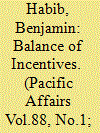

|
|
|
|
|
| Summary/Abstract |
This study is concerned with motivations driving North Korea’s interaction with the United Nations Framework Convention on Climate Change, drawing on information from treaty reporting documents, along with project reports compiled by international agencies and official statements released by the North Korean government. The article draws on causal inference to explore the hypothesis that the leadership perpetuation and state survival imperatives of the North Korean government represent the most likely explanation for North Korea’s interaction with the international climate change regime. It finds a strong probability that North Korea is utilising the UNFCCC as a capacity-building vehicle across its agricultural and energy sectors, a weak issue_images_88_1_Hydroelectric dam at Sinpyong (July 2012)_Habibpossibility that North Korea’s climate change vulnerability is a compelling incentive for greenhouse gas mitigation, and the weak possibility that North Korea is using the Clean Development Mechanism under the UNFCCC as a means for generating foreign currency revenue. The paper argues that the balance of incentives underpinning these motivations can be linked to the leadership perpetuation and state survival imperatives of the North Korean government.
|
|
|
|
|
|
|
|
|
|
|
|
|
|
|
|
| 3 |
ID:
138176
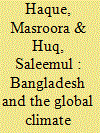

|
|
|
|
|
| Summary/Abstract |
The yearly international climate change negotiations, also known as Conferences of Parties (COPs), are large and formidable affairs. Under the aegis of the United Nations Framework Convention on Climate Change (UNFCCC), government ministers, bureaucrats, and other delegates from developed and developing countries come to hash out compromises. Civil society organizations, activists, researchers, scientists, UN officials, journalists, students, and private-sector leaders come from all over the world to protest, network, and exchange ideas.
|
|
|
|
|
|
|
|
|
|
|
|
|
|
|
|
| 4 |
ID:
127531
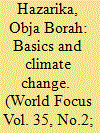

|
|
|
| 5 |
ID:
171078
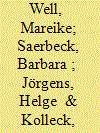

|
|
|
|
|
| Summary/Abstract |
International public administrations (IPA s) play a significant role for the success of multilateral negotiations. As the bureaucratic bodies of international organizations, they are deeply involved in international negotiations, but receive little credit for their outcomes. By studying the administrative styles of the Secretariat of the UN Framework Convention on Climate Change (UNFCCC), this article arrives at an understanding of how this IPA aims at contributing to the outcome of multilateral climate change negotiations. Administrative styles can be conceived of, ideal typically, as being entrepreneurial or servant-like. The article observes that, despite a prohibitively strict mandate as a technocratic facilitator, the UNFCCC Secretariat adopts an entrepreneurial style at the policy initiation stage and a cautiously entrepreneurial style during the policy formulation phase. It has acquired a distinctive actor quality in the climate regime, motivated by a strong commitment to furthering meaningful cooperation and driving the UNFCCC process toward ambitious climate policies.
|
|
|
|
|
|
|
|
|
|
|
|
|
|
|
|
| 6 |
ID:
124204
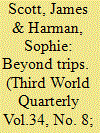

|
|
|
|
|
| Publication |
2013.
|
| Summary/Abstract |
The current round of World Trade Organization (WTO) negotiations-the Doha Round-has significant implications for global health which have received insufficient attention from the global health community. All too often the health implications of global trade agreements are examined only after their conclusion, and are concerned only with intellectual property rights. This paper seeks to move beyond this narrow focus and elucidate the wider health implications of the Doha Round. It explores the negative effect of the Round on state capacity to provide and regulate health services in low-income countries, and the impact it will have on livelihoods among the poor and their ability to access health services. Overall the paper makes the case for greater engagement from the health community with the wto and the Doha Round negotiations beyond the customary focus on intellectual property rights.
|
|
|
|
|
|
|
|
|
|
|
|
|
|
|
|
| 7 |
ID:
086723
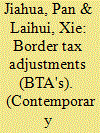

|
|
|
|
|
| Publication |
2009.
|
| Summary/Abstract |
As the target commitment period under the Kyoto Protocol nears its end, further measures are under consideration by all the parties to the UNFCCC to have effective emission reduction that will not damage the economy. In order to set a post 2012 emission reduction target, as individual party as player in the clmate game requires others to make comparable commitments for reasons of environmental effectiveness and international competitiveness.
|
|
|
|
|
|
|
|
|
|
|
|
|
|
|
|
| 8 |
ID:
153126
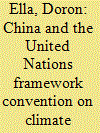

|
|
|
|
|
| Summary/Abstract |
This article examines how categorization mechanisms of the United Nations Framework Convention on Climate Change (UNFCCC) have affected the dynamics between China and other member states during the process of environmental negotiations, and how this categorized institutional environment influenced members’ bargaining positions during the studied period. It argues that by categorizing it as a non-Annex I Party, the UNFCCC conferred on China a context-specific role of a developing country and legitimized its reluctance to abide through legally binding commitments. Yet, as China’s capabilities changed, its institutional role as a developing country was perceived by other member states as inappropriate. Consequently, various member states, such as the United States and the European Union, expected China to enact the role of a rising power, which meant abiding by legally binding commitments and abandoning its current category group. Furthermore, during these negotiations, both China and other member states utilized the UNFCCC’s categorization mechanisms, by emphasizing institutional categorical positioning, in order to enhance their bargaining power. Therefore, this article illustrates how the parties to the Convention were able to reach a successful, binding, and inclusive agreement in Paris.
|
|
|
|
|
|
|
|
|
|
|
|
|
|
|
|
| 9 |
ID:
114860
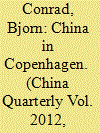

|
|
|
|
|
| Publication |
2012.
|
| Summary/Abstract |
The contradiction between the astonishing dynamic of China's domestic climate policy agenda and its seemingly tenacious position in international climate negotiations presents a puzzle that, on closer inspection, reveals much about a nation at the crossroads, undecided which way to turn. The alterations in China's political interests connected to the issue of climate change are clearly evident in the domestic policy changes China introduced during previous years. However, China's leadership thus far has remained hesitant to translate this new set of interests fully into a coherent position in the international arena. China's mounting difficulties in reconciling its rapidly changing role on the international stage with its altered domestic situation, as well as its traditional foreign policy interests and principles, undermine its ability to pursue a consistent and effective strategy in international climate negotiations. China's reluctance to redefine its role in the international arena has led to a number of inconsistencies that particularly plagued its position during the Copenhagen conference, adding to the overall non-constructive dynamic of the proceedings that ultimately left China, as everyone else, with empty hands. The Copenhagen negotiations demonstrated that China's leadership will have to address these inconsistencies resolutely if it wants to realize the benefits that international climate cooperation offers.
|
|
|
|
|
|
|
|
|
|
|
|
|
|
|
|
| 10 |
ID:
141249
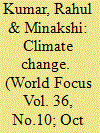

|
|
|
|
|
| Summary/Abstract |
The issue of climate change is one of the most vehemently debated topics in the national and international domain and it has its impact in almost all sectors of human existence, be it on health, economy, and environment and so on. According to United Nations Framework Convention on Climate Change (UNFCCC), change in climate is in one way or the other linked with human activity. It defines climate change as the change that can be attributed “directly or indirectly to human activity that alters the composition of the global atmosphere and which is in addition to natural climate variability observed over comparable time periods” A slightly different approach is adopted while defining climate change by Intergovernmental Panel on Climate Change (IPCC). IPCC has defined climate change as “change in the state of the climate that can be identified by changes in the mean and/or the variability of its properties, and that persists for an extended period, typically decades or longer. It refers to any change in climate over time, whether due to natural variability or as a result of human activity.
|
|
|
|
|
|
|
|
|
|
|
|
|
|
|
|
| 11 |
ID:
142562
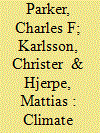

|
|
|
|
|
| Summary/Abstract |
Past research has posited that effective leadership is an essential ingredient in reaching international agreements and overcoming the collective action problems associated with responding to climate change. Despite its fundamental importance for leadership relationships, the demand side of the leadership equation has been comparatively neglected in the literature. In this study, we answer several related questions that are vital for understanding the leadership dynamics that impact the United Nations Framework Convention on Climate Change (UNFCCC) negotiations. Are there any leaders in the field of climate change and, if so, who are they? How do followers select climate leaders? What factors are important to them? Using unique survey data collected at four consecutive United Nations (UN) climate summits, Conference of Parties (COP) 14–17, this article investigates which actors are actually recognized as playing a leadership role in the UNFCCC negotiations and probes how followers select leadership candidates in this issue area. The survey findings reveal a fragmented leadership landscape, with no one clear-cut leader, and spotlight that if an actor seeks to be recognized as a leader, it is crucial to be perceived as being devoted to promoting the common good.
|
|
|
|
|
|
|
|
|
|
|
|
|
|
|
|
| 12 |
ID:
138904
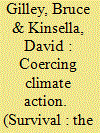

|
|
|
|
|
| Summary/Abstract |
At UN-sponsored climate talks in 2013, the Group of 77 (G77) developing countries, joined by China, walked out briefly in protest against the failure of rich countries to provide a ‘loss-and-damage mechanism’ that would compensate poor countries for the detrimental effects of climate change. At the same conference, Japan’s announcement that it would not meet its emissions goals brought widespread condemnation. These events reflected an intensification of the most persistent deadlock in climate negotiations since the UN Framework Convention on Climate Change (UNFCCC) was agreed in 1992.
|
|
|
|
|
|
|
|
|
|
|
|
|
|
|
|
| 13 |
ID:
127049
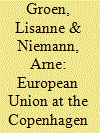

|
|
|
|
|
| Publication |
2013.
|
| Summary/Abstract |
This article analyses the extent of European Union (EU) actorness and effectiveness at the 15th United Nations Framework Convention on Climate Change (UNFCCC) Conference of the Parties (COP) meeting in Copenhagen in December 2009. Although the EU has been characterised as a leader in international climate policy-making for some time, the COP 15 meeting in Copenhagen has overall brought about disappointing outcomes for the Union. This casts doubts on EU actorness and effectiveness in this field. We take the article by Jupille and Caporaso as a conceptual point of departure and then specify a more parsimonious actorness framework that consists of coherence and autonomy. Effectiveness is conceptualised as the result of actorness conditioned by the 'opportunity structure', that is, the external context that enables or constrains EU actions. We hold that EU actorness was only moderate, especially given somewhat limited coherence. In terms of the opportunity structure, we argue that the strong involvement of other important actors with rather different positions adversely impacted on EU effectiveness, along with a high degree of politicisation that constrained the European Union's ability to negotiate effectively.
|
|
|
|
|
|
|
|
|
|
|
|
|
|
|
|
| 14 |
ID:
121859
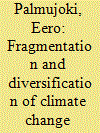

|
|
|
|
|
| Publication |
2013.
|
| Summary/Abstract |
This article examines the discourses on the fragmentation and diversification of environmental governance through frames offered by the English School (ES) of International Relations (IR) scholars in order to apply their frame to climate change governance. It argues that the ES approach emphasises the pluralist starting-points of international law and governance. This article does not try to analyse pros and cons of fragmentation and diversification; rather, it examines whether the society is 'thin' or 'thick' regarding climate change governance. To what extent can the climate change practices established be spoken of as primary institutions? This is significant in order to weigh the future developments of governance. In the last section of the article, this discussion is realised by examining the developments of climate change governance both within and without the context of the UN Framework Convention for Climate Change (UNFCCC).
|
|
|
|
|
|
|
|
|
|
|
|
|
|
|
|
| 15 |
ID:
180238
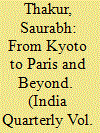

|
|
|
|
|
| Summary/Abstract |
Anthropogenic climate change has emerged as the most disruptive socio-political issue in the last few decades. The Kyoto Protocol’s failure to curb the rising greenhouse gases emissions pushed the UNFCCC-led negotiations towards a more flexible, non-binding agreement at the Paris COP21 meeting in 2015. The Paris Agreement’s hybrid approach to climate change governance, where flexible measures like the nationally determined commitments are balanced against the ambition of limiting the global temperature within the two-degree range, ensured the emergence of an increasingly complex and multi-stakeholder climate change regime. The article outlines the roadmap of the transition from the top-down approach of Kyoto Protocol to the legally non-binding, bottom-up approaches adopted for the post-Paris phase. The article outlines the post-Paris developments in international climate politics, which hold long-term geopolitical and geoeconomic implications. The article focuses on the fundamental shifts and balances within the UNFCCC architecture and examines the four fundamental features of this transition—the interpretation of differentiation and common but differentiated responsibilities, the evolving role of emerging economies in the negotiations, the rising profile of non-party stakeholders in shaping the climate action strategies and the emergence of climate justice movements as an alternate site of climate action.
|
|
|
|
|
|
|
|
|
|
|
|
|
|
|
|
| 16 |
ID:
151002


|
|
|
|
|
| Summary/Abstract |
The issue of loss and damage has historically been politically contentious, with developed countries being afraid of being held responsible, and developing countries demanding some form of compensation for being disproportionately impacted by climate change-induced loss and damage. After much debate between developed and developing countries, the Paris Agreement took the middle road between the varying outcomes envisioned by developed and developing countries. The Agreement recognised the most vital demands of the developing countries to incorporate loss and damage as an independent pillar of the UNFCCC process and made the Warsaw International Mechanism permanent. Considering the discomfort among the developed block, the language of the Agreement was general and non-binding in character, overtly excluding the possibility of liability or compensation under loss and damage, which many have been described as a failure for vulnerable countries. Thus, the major challenge for the COP22 will be to expedite the discussion around financing and legal responsibility for loss and damage. This article discusses the road towards the Paris Agreement in light of the history of negotiations on loss and damage under the UNFCCC and aims to understand how it will impact the future of loss and damage.
|
|
|
|
|
|
|
|
|
|
|
|
|
|
|
|
| 17 |
ID:
118245
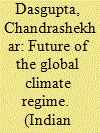

|
|
|
| 18 |
ID:
092254
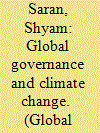

|
|
|
| 19 |
ID:
127523
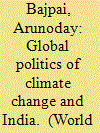

|
|
|
| 20 |
ID:
127521
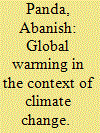

|
|
|
|
|
|
|
|